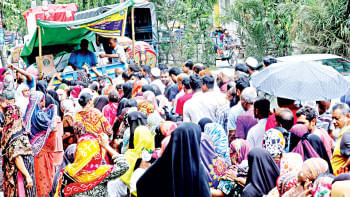Business leaders get CIP cards
The government yesterday awarded 164 commercially important persons (CIPs) for their contribution to the economy.
The CIPs -- under the export and trade categories for the year 2013 -- have been selected on the basis of their performance assessed by the Export Promotion Bureau. The award is given every year but it gets delayed by the lengthy inspection and verification procedures.
Commerce Minister Tofail Ahmed handed over the cards to the awardees at a programme at Radisson Hotel in Dhaka. Of the recipients, 125 businesspeople were given the cards in the export category and 39 in the trade category.
At the event, Ahmed said the rules of the CIP cards should be changed so that the businessmen can get the cards quickly.
The minister advised businessmen to diversify both export products and markets to increase the value and volume of exportable goods. The government has already increased the amount of cash incentives given on the export of different goods, he said. Bangladesh aims to earn $5 billion a year from the exports of leather and leather goods by the end of 2021. IT goods and services have the potential to make exports worth $5 billion by 2021; the same is true for pharmaceuticals as well, he added.
Mafruha Sultana, vice-chairman of EPB, said the government awards CIP cards on export performance under 22 types of products.
But the cards were awarded under 14 types of products for 2013, Sultana added.
Bangladesh exported 744 types of products to 198 countries last year, she said.
Abdul Matlub Ahmad, president of the Federation of Bangladesh Chambers of Commerce and Industry, urged the government to keep the price of electricity between Tk 5 and Tk 6 a unit, as businessmen can hardly afford the higher price of power to run their units.
He also urged the government to complete construction of the
World Trade Centre in Bangladesh, so that the government and businesses can run international business activities easily from the centre.
On behalf of the recipients at the ceremony, Abu Alam Chowdhury, former vice-president of the FBCCI, said the CIP cards would encourage the exporters to perform better.
Chowdhury cited an example of how business activities create jobs. Hogla, a species of aquatic grass, had previously been used for making mats in rural Bangladesh; now thousands of workers, especially women in the southern district of Bhola, make ropes out of the plants for export.
He urged the government to increase cash incentives for hogla exports to 20 percent from 15 percent now, as it falls in the agricultural goods category. “This is a non-traditional export item.”
Hedayetullah Al Mamoon, senior secretary to the commerce ministry, chaired the event.

 For all latest news, follow The Daily Star's Google News channel.
For all latest news, follow The Daily Star's Google News channel. 



Comments